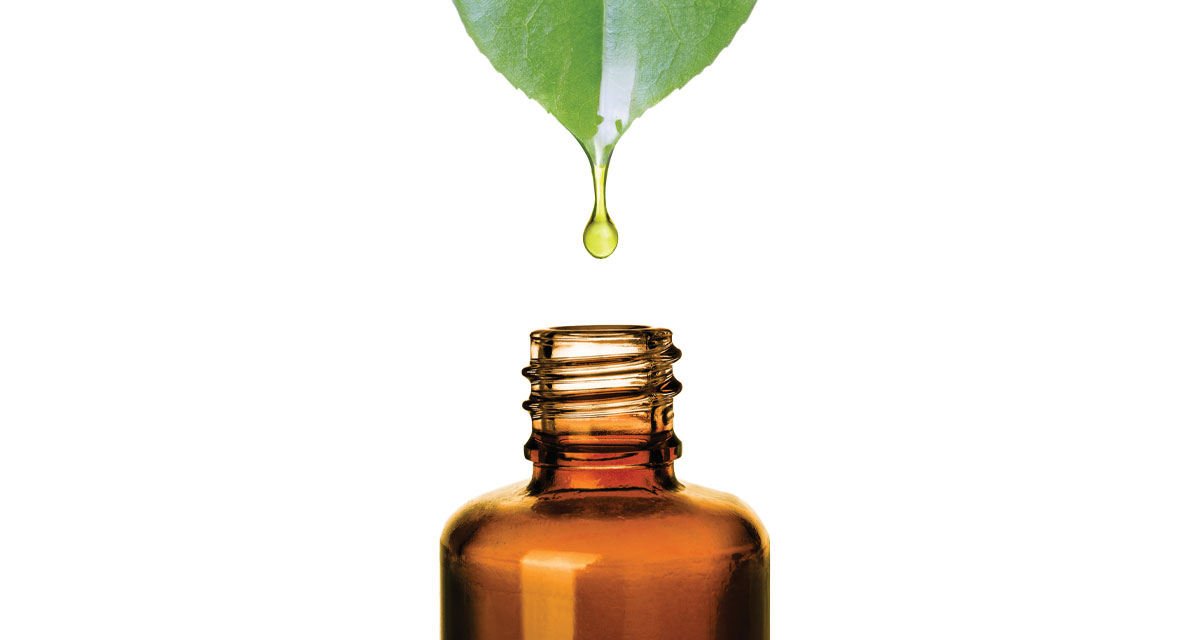A one-ounce glass bottle appears tiny; yet, the contents are a surprising gift from nature. Extracting the raw oils from plant matter is not a new phenomenon. In recorded history, the Egyptians in 4500 BC used their renowned knowledge of ointments and aromatic oils to make medicines. Across countries and generations, we learned the value of extracting oil from plant matter. As the popularity of essential oils grew, so did our understanding of the relationship of scent to healing.
The Making of an Essential Oil
Terms like “extraction” and “distillation” describe the general process of separating essential oils from plant matter to create a raw, botanical liquid. You, too, can create essential oils by picking your favorite leaves. Choose quality, healthy or new growth from the second season of echinacea, peppermint, or lavender, for instance. A distiller aids to create steam, which pulls or extracts oil from the plant and pushes the contents through a tube. As the liquid condenses and cools, the oil naturally separates from water to be collected.
Additional Methods:
- Tapping Trees: Acquiring oils from frankincense, myrrh, cinnamon, and sandalwood, which are trees, requires the removal of resin, a sap-like substance, before drying and distilling it into a liquid.
- Cold Pressing: Citrus oils require the extraction of the entire fruit. Luxurious scents such as bergamot, lemon, and lime can go through a process of agitation or grating to lift the oils to the surface. Once water mixes with the fruit, the oil separates and is collected.
What is a Carrier Oil?
It’s hard to believe an essential oil requires dilution to apply it safely to the skin, but it does. Surprisingly, you benefit from this protection in massage oils, scrubs, salves, lotions, and balms. The term “carrier” typically refers to a fatty oil. Jojoba oil, for instance, comes from seeds of the jojoba plant and provides a wax with powerful moisturizing properties. It’s believed to mimic the skin’s natural oil. Avoiding harmful processes of heat, carrier oils require cold pressing to safely release the botanical value to your skin.
It is vital to properly research an oil before applying it as a topical. The solution should contain up to five percent of essential oil and between 95 to 97% carrier. To protect yourself from irritation, dab the inside of your arm with the oil, place on a Band-Aid, and wait to see the impact across 24-hours.
- A list of Carrier Oils: apricot kernel, argan, avocado, black seed, rosehip, grape seed, olive, sunflower, sweet almond
The Benefits of Essential Oils
A pure-grade essential oil has many benefits, depending on the scent. Which names appeal to you?
- Bergamot: Think green and refreshing. It offers relaxation and aids digestion.
- Chamomile: It has a sweet, apple fragrance. Increases feelings of confidence and eases nervous tension. Ideal for menstrual cramping.
- Cinnamon: A spice of comfort! Great for an emotional lift to soothe anxiety. And, a safeguard against insects.
- Cedarwood: A smell connection to the woods. Aids sleep, provides stress relief, and helps the circulatory system.
- Clary Sage: A scent of musk. Used to sharpen mental acuity or improve clarity.
- Eucalyptus: A sharp, pine scent with a hint of honey. A good fragrance to ease congestion, loosen mucus buildup, and joint pain.
- Frankincense: A reminder of pine, lemon, and the woods. A helpful oil for those with asthma or psoriasis. It slows and deepens the rhythm of breathing.
- Geranium: A combination of herbs, especially mint. Relaxes and calms, and boosts energy levels.
- Ginger: A spicy, warm, and woody smell that opens up the senses. Treats stomach difficulties and alleviates heartburn.
- Lavender: Sweet and floral. Encourages a restful sleep and shrinks headache pains. It also soothes sun-damaged skin and cuts.
- Lemon: Sharp citrus, but sweet! Boosts mood and mental clarity. Includes antiseptic and antibacterial properties; therefore, add a few drops to daily cleaning products.
- Peppermint: A cool, refreshing mint. Provides energy and stimulates the mind!
- Sandalwood: Woody, and offers an exotic aroma! Promotes mental clarity!
- Sweet Orange: A sweet, intoxicating smell! Offers calmness, especially in cases of PTSD, and aids the digestive system.
- Tea Tree: A spice mixed with camphor. Ideal as an insect repellent, is a natural deodorant, and boosts wound healing.
Skilled in essential oil blends, you, too, can learn how to combine essential oils to make “Synergy!” Just imagine the feeling of a fragrance labeled “radiance” or “relaxation”! The experience sounds magical!
Whether you delve into making essential oils or enjoy buying vials from a well-respected and accredited company, the application can boost health and wellness! Keep up the research!



















